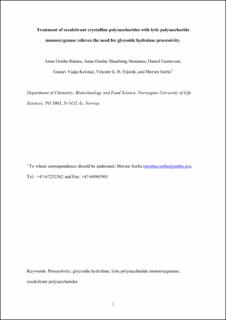Treatment of recalcitrant crystalline polysaccharides with lytic polysaccharide monooxygenase relieves the need for glycoside hydrolase processivity
Hamre, Anne Grethe; Strømnes, Anne-Grethe; Gustavsen, Daniel; Vaaje-Kolstad, Gustav; Eijsink, Vincent; Sørlie, Morten
Peer reviewed, Journal article
Accepted version
Permanent lenke
https://hdl.handle.net/11250/2689829Utgivelsesdato
2019Metadata
Vis full innførselSamlinger
Originalversjon
10.1016/j.carres.2019.01.001Sammendrag
Processive glycoside hydrolases associate with recalcitrant polysaccharides such as cellulose and chitin and repeatedly cleave glycosidic linkages without fully dissociating from the crystalline surface. The processive mechanism is efficient in the degradation of insoluble substrates, but comes at the cost of reduced enzyme speed. We show that less processive chitinase variants with reduced ability to degrade crystalline chitin, regain much of this ability when combined with a lytic polysaccharide monooxygenase (LPMO). When combined with an LPMO, several less processive chitinase mutants showed equal or even increased activity on chitin compared to the wild-type. Thus, LPMOs affect the need for processivity in polysaccharide degrading enzyme cocktails, which implies that the composition of such cocktails may need reconsideration.

